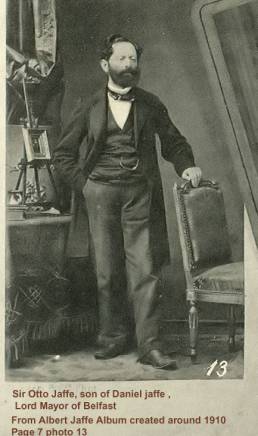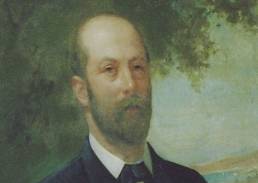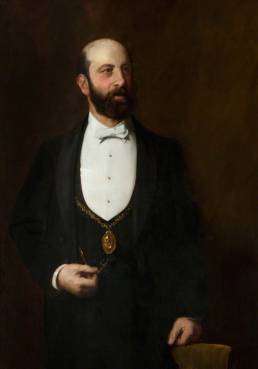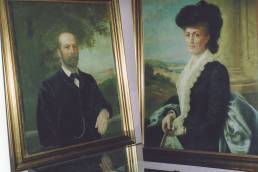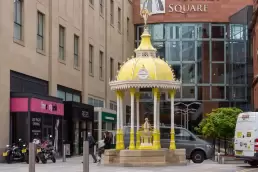Sir Otto Jaffe was born in Hamburg in 1846. He came to Belfast at the age of 12 and at 16 he entered the family business, Jaffe Brothers Linen Merchants.
Otto entered public life in 1894 when he was chosen to represent St Anne’s Ward for the Belfast Corporation and in 1899 he was elected Lord Mayor of Belfast for the first time. He was a Liberal Unionist and indeed was active in Unionist politics most notably the anti-Home Rule campaign.
In 1900 Otto Jaffe was knighted by the then Lord Lieutenant, Lord Cadogan and in 1904 he was made Lord Mayor of Belfast for the second time.
He was one of the leading advocates of Unionism articulating a strong economic and commercial case against Home Rule. He feared it would have a devastating impact on Belfast business life and the wider economic wellbeing of Ireland.
He built his house, Kin Edar, in 1898 shortly before he became Lord Mayor for the first time. This impressive residence stood on ground near what is now Sydenham Avenue in east Belfast
Philanthropy
Sir Otto was well known throughout his public life in Belfast for his generosity of both time and money. During his first term as Lord Mayor he and the Lady Mayoress raised £10,000 for the dependants of soldiers and sailors serving in the Boer War. He was officially connected with the Royal Victoria Hospital where he was Governor, having also contributed £1,000 of his own money to the original building fund. Otto was particularly interested in education and in 1905 he gave £4,000 to the fund for better equipment for Queen’s College (now university). He was an active member of the committee which got the Public Libraries Act extended to Belfast, leading to the first free library being established. In 1904, he contributed £4,000 to the building of a new synagogue in north Belfast.Three years later he erected the Jaffe School for the Jewish Children of Belfast on the Cliftonville Road, again at his own cost.
Sir Otto is also connected to east Belfast through the linen industry. In 1910 he erected the Jaffe Spinning Mill on the Newtownards Road, also known as Strand Spinning.This provided work for about 350 local people, rising to 650 in 1914 when the company expanded to make munitions. In later years the business was bought over by James Mackie and Son and is still visible today as the PortviewTrade Centre.
Impact of the War
The First World War tore Europe apart and as the appalling loss of life registered with the public ant-German sentiment grew. The press often fuelled the paranoia and even the Royal Family had to erase their German heritage and family name. In 1914, after the outbreak of World War I, the government passed the Aliens Restriction Act.This controlled the activities of so called ‘enemy aliens’, restricting their movements and preventing them from living in certain areas.The Trading with the Enemy Act also closed down any German owned businesses.
In 1888 Otto Jaffe had been naturalised as a British citizen and denaturalised as a German Citizen. He was a unionist and saw himself as being loyal to king and country. His eldest son Arthur was also a captain in the London Irish Rifles and was fighting in the war. His stand against this legislation and treatment was well publicised and even raised in Parliament.
However his wealth, prominence and impeccable credentials and service did not prevent him from being viewed with suspicion. During the early days of 1915 Sir Otto and Lady Jaffe continued to live in Belfast with relative normality. But when a passenger liner, the Lusitania was torpedoed by a German submarine off the coast of Cork on 7 May resulting in the death of 1,000 people, anti-German feeling in Britain and Ireland rose to breaking point.
Friends of the Jaffes began to turn their backs on them and they even had to resign their place on the Committee of the Children’s Hospital when a group of local ladies refused to subscribe again if they stayed.
In a passioante letter to the Northern Whig in May 1915, Sir Otto states
“how anyone who has any knowledge of me and my life would think that I could approve of the horrible and detestable actions of which she (Germany) has been guilty is almost beyond my comprehension.” He also described himself as being “overwhelmed with pain and sorrow”.
Although it was agreed in the House of Lords, that it would not be reasonable for any naturalised Germans to face a tribunal and subsequent internment, it would seem that Sir Otto still felt compelled to leave Belfast for London in 1915.
Those who knew him say he left a broken man. He resigned his post as Alderman of Windsor Ward from Belfast City Council in June 1916 when he was almost 70 years of age.
He must have realised then that he would never return to Belfast, and by 1918 he was selling off some of his properties at less than a quarter of their value.
Sir Otto lived out the remainder of his life in London until his death in April 1929 at the age of 83.


